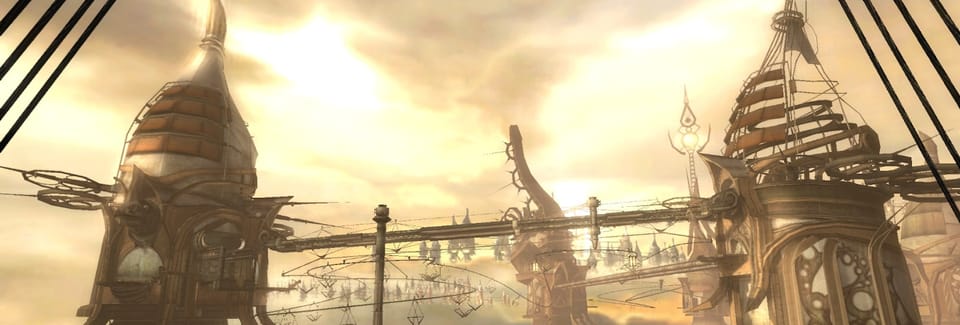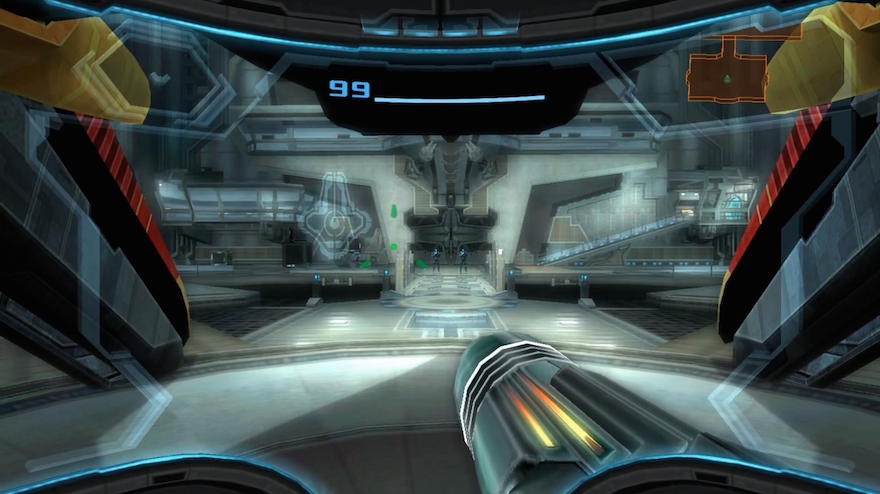Alone in a crowd in Metroid Prime 3: Corruption

When Metroid Prime 3: Corruption landed in 2007, the formula was stone: explore, scan, shoot, repeat. Yet by this point the perfected balance had gotten stale: Prime 2 was slighted for being a smidge of a slog, the first Metroid had already been rebooted for the Gameboy Advance, and even the word “metroid” was smashed with “-vania” to mean “any game where you can get lost pretty easy.” As is the right for most final franchise installments, the standard for success was ripe for Corruption to tear down; it might not be enough take another off-the-rails jaunt around a dead planet.
Nintendo is famously resistant to change, at least when it threatens their larger named games, so it’s no surprise that Corruption opts to play it safe by nudging the canoe rather than rocking the boat. Explore, scan, shoot, repeat, but now with a twist of lemon: non-player characters who aren’t ghostly messages or expositional voices in the wire (also: some Wiimote waggling). On paper it’s cold and a bit uninspired, but by giving us a taste of the wider galaxy through other living sentient creatures, rather than setting Samus adrift on individual planets centuries into their fossilization, her solitude is more keenly felt than ever before.
Explore, scan, shoot, repeat, but now with a twist of lemon
Of all the Prime games, Corruption is the only one that has you interacting directly with other humanoids who aren’t trying to kill you—at least not without speaking to you first. The game begins with Samus Aran essentially clocking in for the day, learning the ins-and-outs of first person action door-lock management as she strides up to the boss’s office. There she meets her rag-tag bounty hunting crew, each of whom are not particularly nuanced persons but are given distinct enough character notes to indicate that galaxies are large and often contain actual ongoing civilizations. In most previous Metroid games, Samus is late to the party and catches only the dregs of whatever massive catastrophe went down. But here, after a few trust falls with the gang, she’s at the forefront of an actual attack. Alongside the new bounty hunters she is given the chance to do some actual rescuing of a few space marines rather than simply picking through the corpses left behind. We finally get a glimpse of the living people Samus has been trying to protect.
Comparatively, these relationships are a little thin. This is no Mass Effect; you won’t be having “deep” conversations or pushing Samus to hook up with an ice alien anytime soon. The theme here is “corruption,” and it’s not just the Space Pirates raging on radioactive phazon steroids. It might have been enough to see the scan visor reflection of Samus get more and more fucked up as the game went on, our taciturn hero grinding stoically through these planets and suffering alone. The extra turn of the knife that sets Prime 3 apart from the rest of the series is that Samus is not the only victim of the corruption, although she is alone in cleaning up the mess again.

In fact, she is more alone than ever. In the previous games, she scanned items for backstory, as a way of creating depth for her while exploring, but this time you have to mirror the historical tragedies you encounter. Samus isn’t a badass just because she’s wrestling with Ridley or the eponymous floating jellyfish for the fortieth time. In Prime 3, she faces the same corruption as her bounty hunter peers while being forced to take them down one by one and absorbing their abilities so that she can move forward. Samus’s enemies up to this point have been demonstrably evil or at least naturalistically cruel, explicitly separate from her worldview and motivations. But these other bounty hunters are her people now, as opposed to the extinguished Chozo, the technologically advanced bird-man race who raised her as an orphan and scattered their gear all over the universe for her and everyone else to find. These bounty hunters are the closest thing she has to a family, and if they can fall, so, perhaps, can she. Our unflappable heroine gains a shred of fallibility and relatability.
The result doesn’t transform Metroid, but cracks it open just a bit wider. While you explore these planets that self-destructed on the power the Chozo shared with the best of intentions, you are more in line with the tragedy of Samus, forced to cut down the only people who understand the loneliness of being a space bounty hunter. For a bunch of games defined by isolation, what else could serve to reinforce that feeling than a flicker of what you are truly isolated from: other people.



